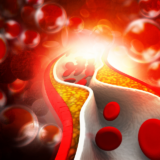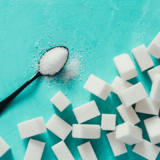Honey & Sugar: Dissimilar?








Honey and Sugar: Are They Really Dissimilar?
Honey and sugar – brief bio
Both honey and sugar consist of approximately similar amounts of glucose and fructose. Glucose and fructose are absorbed directly into the bloodstream. Sucrose is different from these 2 in that it must be broken down first before being absorbed into the blood stream. Glucose is used for energy or stored as glycogen. Fructose is converted to glucose or stored as fat.
However, one of the biggest differences is that with honey, the two molecules, glucose and fructose, are separate and not bound together. Honey is comprised of primarily monosaccharides. Mono means one, saccharide means sugar. On the other hand, sugar consists of primarily a disaccharide (di meaning two types of sugars, joined together), which is sucrose. Sucrose has the same glucose and fructose that one can find in honey, but the glucose and fructose are chemically bound together.
In summary, Glucose and Fructose are absorbed directly into the bloodstream whereas Sucrose must be broken down first before being absorbed into the blood stream.
Are they digested differently by the body?
Let’s consider what happens when we digest these types of carbohydrates? Both monosaccharides and disaccharides eventually become the same thing—that’s because disaccharides and polysaccharides (even more complex sugar chains) digest and break down into individual sugars, or monosaccharides. When we consume honey, we get glucose and fructose. When we eat sugar, we get sucrose. Ultimately, they both, honey and sugar, produce the same outcome saccharides, though the time taken to make both usable might vary little bit.
Both result in blood sugar surge in a similar fashion. They have glycemic indices that aren’t significantly different.
The sugars in honey and cane sugar are digested and metabolized in different areas of the body, though. The sucrose in sugar requires an enzyme located in the small intestine, to digest it and break down the bonded sugars into separate and more readily-available fructose and glucose. From there, the glucose can be released into the bloodstream to be used directly by your cells for energy, while the fructose must first be converted into glucose—some of that conversion happens in the small intestine, and some in the liver. In honey’s case, the fructose and glucose are already separated, and don’t require enzyme digestion, but the fructose still has to wait until it reaches the small intestine to be converted to glucose, or released to the liver for conversion. Therefore, someone who is an athlete might get a faster shot of readily usable energy from saccharides when he or she consumes honey compared to when sugar is consumed.
In summary, not really…they aren’t digested very differently by the body; they both, sugar and honey, produce the same output saccharides.
Is there an advantage of choosing honey over sugar?
Perhaps, yes; if we consider raw honey. To understand it further, let’s dwell on what else is present in honey that might elevate its status above sugar as something whose health benefits might surpass its other effects as a saccharide on saccharide metabolism system.
- Antibacterial and antiviral properties: It comes from bees. Nectar from flowers is ingested and processed using gut bacteria of the bees. The outcome of this is stored the honeycombs. This is what is harvested for use as honey, as we know it. Honey contains natural antibacterial enzymes, including one that actually produces hydrogen peroxide. That’s why honey is being studied for its ability to boost the immune system when dealing with bacterial or viral infections.
- Enzymes and probiotics: Bees themselves have been found to possess an impressive array of beneficial bacteria within their little bee guts, and these probiotic bacteria can also be found in honey and may help proliferate lactic acid bacteria found in human gut, along with various enzymes that may aid in digestion.
- Oligosaccharides and gut health: Though the sugars in honey are primarily monosaccharides glucose and fructose, there are also some more complex sugar chains known as oligosaccharides that are present in honey. These sugars may be responsible for some of honey’s benefits, as they have been shown to have prebiotic activity which may have an effect on gut health.
- Vitamins and minerals:A small number of vitamins and minerals are found in honey, though, their actual quantity may be quite small compared to what needs to be actually consumes as per recommended dietary allowance. This, however, is an added advantage.
- Antioxidant properties: Honey contains polyphenols, which are a class of antioxidants that are thought to reduce the risk of several chronic disorders by neutralizing free radicals that cause oxidative stress in the human body. Regular consumption of honey can potentially increase levels of beneficial polyphenols in the blood.
- Usefulness as a humectant/moisturizer upon topical use: Honey is an effective natural humectant – a natural moisturizing agent that has remarkable properties to promote skin glow and moisture levels.
In summary, other than taste, there are other potentially compelling health benefits of honey as well as discernible nutritional value that make it a great candidate as replacement of other processed and highly refined sugars.














85 comments
delta 8 THC
July 3, 2021 at 2:53 am
I don’t know if it’s just me or if perhaps everyone else experiencing issues with your site.
It seems like some of the written text within your posts are
running off the screen. Can somebody else please comment and let me know if this is happening to them too?
This may be a problem with my internet browser because
I’ve had this happen before. Thanks
admin
July 13, 2021 at 9:10 pm
Thank you for stopping by. The IT team confirms there are no such issues identified by them so far.
Abdul Rahim
December 7, 2021 at 11:37 am
Great work! This is the type of info that are supposed to be shared around the net. Shame on Google for now not
positioning this post upper! Come on over and discuss with my site . Thank you =)
gernek
January 14, 2022 at 7:54 am
It is very impressive, i enjoyed and liked the site. thank you
Zygmunt Solorz
July 2, 2022 at 9:08 pm
Please email me with any hints on how you made your site look this awesome, I would be appreciative!
Jean Michelle
August 23, 2022 at 9:40 am
Good post. I learn something new and challenging on blogs I stumbleupon everyday. It will always be interesting to read articles from other authors and use a little something from their sites.
Victoria Agnel
August 27, 2022 at 4:32 am
I must thank you for the efforts youve put in writing this site. I really hope to check out the same high-grade content from you in the future as well. In fact, your creative writing abilities has inspired me to get my very own site now 😉
zoritoler imol
September 11, 2022 at 6:05 am
I am now not certain the place you are getting your info, however great topic. I must spend some time learning more or working out more. Thank you for wonderful information I was in search of this information for my mission.
Merwin
May 4, 2023 at 9:36 pm
I like this web site its a master peace ! Glad I observed this on google .
Felx
May 5, 2023 at 3:02 am
I appreciate you sharing this blog post. Thanks Again. Cool.
Amie
May 6, 2023 at 1:12 am
Pretty! This has been a really wonderful post. Many thanks for providing these details.
Shail
May 6, 2023 at 11:22 pm
Very well presented. Every quote was awesome and thanks for sharing the content. Keep sharing and keep motivating others.
Shevarim
May 7, 2023 at 12:59 am
I’m often to blogging and i really appreciate your content. The article has actually peaks my interest. I’m going to bookmark your web site and maintain checking for brand spanking new information.
Genia
May 8, 2023 at 8:16 pm
I really like reading through a post that can make men and women think. Also, thank you for allowing me to comment!
thakkar
May 9, 2023 at 6:54 pm
I like the efforts you have put in this, regards for all the great content.
Annie
May 13, 2023 at 4:43 am
I do not even understand how I ended up here, but I assumed this publish is be great
demo
May 13, 2023 at 2:34 pm
very informative articles or reviews at this time.
Eathen
May 19, 2023 at 6:32 am
I just like the helpful information you provide in your articles
togel taiwan
May 19, 2023 at 12:23 pm
Try to slowly read the articles on this website, don’t just comment, I think the posts on this page are very helpful, because I understand the intent of the author of this article.
Bambu
May 19, 2023 at 12:34 pm
Hi there to all, for the reason that I am genuinely keen of reading this website’s post to be updated on a regular basis. It carries pleasant stuff.
Casas
May 19, 2023 at 1:47 pm
Some really interesting information, well written and generally user genial.
Tallahassee
May 20, 2023 at 3:07 am
I’ve been absent for a while, but now I remember why I used to love this web site. Thank you, I will try and check back more often. How frequently you update your site?
sylvon
May 22, 2023 at 4:50 pm
There is definately a lot to find out about this subject. I like all the points you made
keluaran taiwan
May 22, 2023 at 9:36 pm
Great information shared.. really enjoyed reading this post thank you author for sharing this post .. appreciated
Bambu 4d
May 28, 2023 at 2:18 am
That’s good, but I still don’t understand the purpose of this page posting, no or what and where do they get material like this.
henny herranny
May 29, 2023 at 9:56 am
Very well presented. Every quote was awesome and thanks for sharing the content. Keep sharing and keep motivating others.
rnehaul
May 29, 2023 at 1:03 pm
Cool that really helps, thank you.
bocoran hk
June 4, 2023 at 9:24 pm
I’ve been browsing online more than three hours today, yet I never found any interesting article like yours. It is pretty worth enough for me. Personally, if all webmasters and bloggers made good content as you did, the web will be much more useful than ever before.
Jazwa
June 14, 2023 at 9:54 pm
I have fun with, cause I found just what I was taking a look for. You’ve ended my four day long hunt! God Bless you man. Have a nice day. Bye
Quails
June 14, 2023 at 10:57 pm
Hey! I simply wish to give a huge thumbs up for the great data you could have here on this post. I can be coming again to your weblog for more soon.
Amodio
June 15, 2023 at 6:52 am
Thanks for the update, is there any way I can get an alert email when there is a new update?
jaber tamer
June 16, 2023 at 4:43 pm
There is definitely a lot to find out about this subject. I like all the points you made
Bruce M
June 17, 2023 at 1:54 am
I am truly thankful to the owner of this web site who has shared this fantastic piece of writing at at this place.
ruches
June 21, 2023 at 4:55 am
I don’t commonly comment but I gotta tell thankyou for the post on this perfect one : D.
Bambu4d
June 22, 2023 at 2:07 am
You’re so awesome! I don’t believe I have read a single thing like that before. So great to find someone with some original thoughts on this topic. Really.. thank you for starting this up. This website is something that is needed on the internet, someone with a little originality!
RTP Slot Bambu4d
June 24, 2023 at 5:07 am
Great information shared.. really enjoyed reading this post thank you author for sharing this post .. appreciated
Bambu4d Login
June 24, 2023 at 7:52 am
I do not even understand how I ended up here, but I assumed this publish used to be great
Anonymous
June 24, 2023 at 10:56 pm
very informative articles or reviews at this time.
Bambu 4d
June 26, 2023 at 1:42 am
Nice post
DIANSA RISUCIATI
June 28, 2023 at 6:02 pm
Pretty! This has been a really wonderful post. Many thanks for providing these details.
Bambu4d Demo
June 29, 2023 at 10:24 am
Good post! We will be linking to this particularly great post on our site. Keep up the great writing
Prediksi Togel Jitu
June 30, 2023 at 1:30 am
Cool that really helps, thank you.
rob whitrfc
June 30, 2023 at 7:00 am
There is definately a lot to find out about this subject. I like all the points you made
b adams
July 3, 2023 at 3:42 am
Hi there to all, for the reason that I am genuinely keen of reading this website’s post to be updated on a regular basis. It carries pleasant stuff.
LK21
July 6, 2023 at 9:12 pm
This is really interesting, You’re a very skilled blogger. I’ve joined your feed and look forward to seeking more of your magnificent post. Also, I’ve shared your site in my social networks!
Slot Demo Habanero
July 7, 2023 at 12:35 am
Good post! We will be linking to this particularly great post on our site. Keep up the great writing
Demo PG
July 7, 2023 at 12:36 am
Nice post. I learn something totally new and challenging on websites
Marita Wagner
July 8, 2023 at 4:35 am
I am regular reader, how are you everybody? This piece
of writing posted at this site is actually good.
piper lort
July 8, 2023 at 4:39 am
This blog was… how do I say it? Relevant!! Finally I’ve found something which
helped me. Thank you!
rebeccairish
July 8, 2023 at 4:40 am
Very soon this web page will be famous amid all blogging and site-building viewers, due to it’s fastidious posts
rodney_ratley
July 8, 2023 at 4:41 am
I am sure this paragraph has touched all the internet viewers,
its really really nice paragraph on building up new weblog.
rose mary maudsley
July 8, 2023 at 4:46 am
Remarkable! Its genuinely amazing article, I
have got much clear idea on the topic of from this
article.
ned_mccray
July 8, 2023 at 4:47 am
Awesome article.
carri_scobie
July 8, 2023 at 5:22 am
Hi, just wanted to mention, I liked this post.
It was helpful. Keep on posting!
Raynes8829
July 11, 2023 at 5:54 am
I’m not that much of a internet reader to be honest but your blogs really nice, keep it up! I’ll go ahead and bookmark your website to come back later on. Many thanks
Veda
November 10, 2023 at 6:30 am
Would love to constantly get updated outstanding blog! .
Nandini
November 12, 2023 at 1:28 pm
Great information shared.. really enjoyed reading this post thank you author for sharing this post .. appreciated
Andy
November 21, 2023 at 12:32 pm
Very well presented. Every quote was awesome and thanks for sharing the content. Keep sharing and keep motivating others.
Nancy
November 21, 2023 at 6:43 pm
I just like the helpful information you provide in your articles
redand
November 23, 2023 at 6:35 pm
I simply could not go away your web site prior to suggesting that I really enjoyed the standard info a person supply on your guests? Is going to be back incessantly to investigate cross-check new posts.
Dami
November 25, 2023 at 3:26 am
Some truly excellent info , Gladiolus I noticed this.
Freddie
November 26, 2023 at 11:21 pm
I have not checked in here for some time since I thought it was getting boring, but the last few posts are great quality so I guess I’ll add you back to my daily bloglist.
jamie
November 27, 2023 at 4:46 pm
Pretty! This has been a really wonderful post. Many thanks for providing these details.
benie
November 29, 2023 at 6:55 pm
I got this site from my pal who told me about
this web site and now this time I am browsing this website and reading very informative posts at this time.
Ira Schuk
November 29, 2023 at 9:08 pm
We’re a gaggle of volunteers and opening a new scheme in our community.
Your web site offered us with valuable information to work
on. You’ve done a formidable task and our whole group can be
grateful to you.
Rasha
November 30, 2023 at 2:49 pm
Cool that really helps, thank you.
Toto
November 30, 2023 at 10:53 pm
Try to slowly read the articles on this website, don’t just comment, I think the posts on this page are very helpful, because I understand the intent of the author of this article.
Lexi
December 3, 2023 at 7:14 am
Great information shared.. really enjoyed reading this post thank you author for sharing this post .. appreciated
Bambu
December 5, 2023 at 1:51 am
This is really interesting, You’re a very skilled blogger. I’ve joined your feed and look forward to seeking more of your magnificent post. Also, I’ve shared your site in my social networks!
Maggie Terry
April 21, 2024 at 9:40 am
You consistently deliver top-notch content.
hammons
April 24, 2024 at 9:46 am
Hi there! This is my first comment here so I just wanted to give a quick shout out and say I genuinely enjoy reading your blog posts. Can you suggest any other blogs/websites/forums that cover the same subjects?
Thanks!
Crawford
April 26, 2024 at 4:33 pm
Fantastic site Lots of helpful information here I am sending it to some friends ans additionally sharing in delicious And of course thanks for your effort
Mack
April 29, 2024 at 11:40 pm
Hello there! I could have sworn I’ve been to this blog before but after checking through some of the post I realized it’s new to me.
Anyways, I’m definitely happy I found it and I’ll be bookmarking and checking back frequently!
Bukti
May 1, 2024 at 7:10 pm
I just like the helpful information you provide in your articles
Pred
May 2, 2024 at 6:51 am
Try to slowly read the articles on this website, don’t just comment, I think the posts on this page are very helpful, because I understand the intent of the author of this article.
Shela
May 3, 2024 at 5:58 pm
I do consdider all the ideas you have introduced to your post. They are really convincing and ccan certainly work.
Still, the posts are very short for novices.
Could you please lengthen them a little from next time? Thanks for the post.
Cyrus
May 4, 2024 at 10:15 pm
bookmarked!!, I like your website!
T Thomas
May 8, 2024 at 2:00 pm
I just like the helpful information you provide in your articles
Hansy
May 8, 2024 at 6:38 pm
I like the efforts you have put in this, regards for all the great content.
Lisa
May 9, 2024 at 12:29 pm
very informative articles or reviews at this time.
Panduan
May 12, 2024 at 2:51 pm
Hi there to all, for the reason that I am genuinely keen of reading this website’s post to be updated on a regular basis. It carries pleasant stuff.
Live Draw Lexitoto
May 13, 2024 at 8:02 am
I very delighted to find this internet site on bing, just what I was searching for as well saved to fav
Result Togel Lexitoto
May 14, 2024 at 9:29 pm
Very well presented. Every quote was awesome and thanks for sharing the content. Keep sharing and keep motivating others.
loraine_quam
May 18, 2024 at 2:16 pm
This article was incredibly insightful! I was captivated by the thoroughness of the information and the clear, engaging way it was delivered. The depth of research and expertise evident in this post is remarkable, significantly elevating the content’s quality. The insights in the opening and concluding sections were particularly compelling, sparking some ideas and questions I hope you will explore in future articles. If there are any additional resources for further exploration on this topic, I would love to delve into them. Thank you for sharing your expertise and enriching our understanding of this subject. I felt compelled to comment immediately after reading due to the exceptional quality of this piece. Keep up the fantastic work—I’ll definitely be returning for more updates. Your dedication to crafting such an excellent article is highly appreciated!
chordius
May 21, 2024 at 12:31 am
I appreciate you sharing this blog post. Thanks Again. Cool.